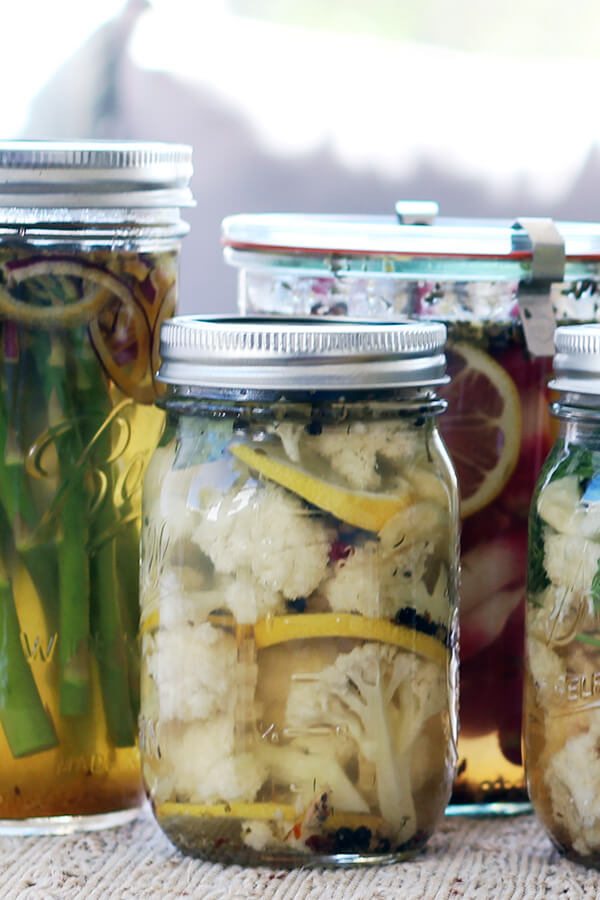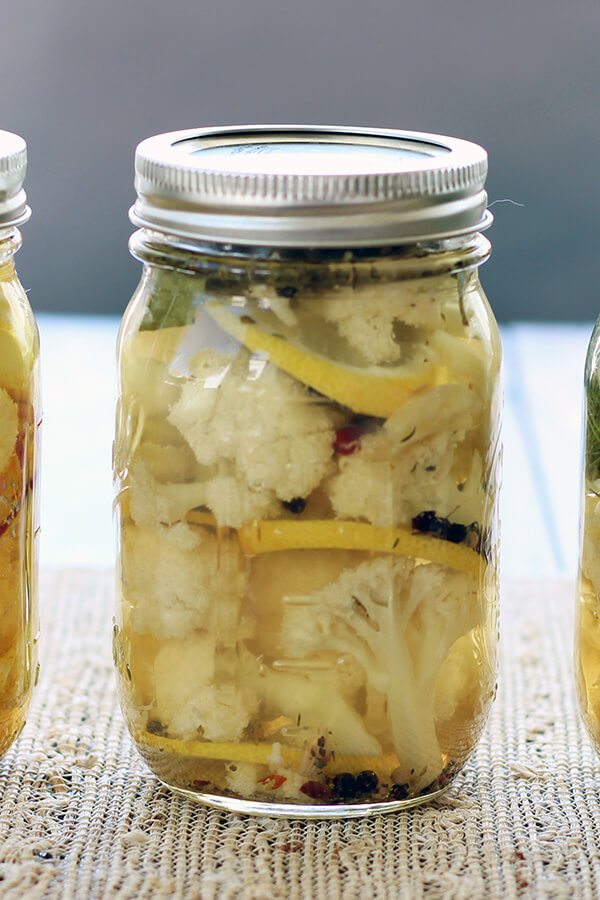
Dried herbs, garlic and lemon are used to flavor these tangy, probiotic, mediterranean cauliflower pickles. These pickles are packed with probiotics, and filled with vitamins that are great for your skin, anti-inflammatory, and energy boosting.
This recipe uses lacto-fermentation, also called brine pickling, to turn the veggies into a healthy, probiotic food. Brine pickling is one of the simplest methods for making fermented vegetables. I highly recommend this method for beginners.
Lacto-fermentation
All the pickled vegetable recipes on this blog use lacto-fermentation. The “lacto” stands for lactobacillus bacteria. Not to be confused with lactose. Lacto-fermentation doesn’t use dairy.
Lacto-fermentation is the oldest form of food preservation in the world. It involves only salt, water and vegetables. The salt water brine creates an anaerobic environment (free of oxygen) where only lactobacillus bacteria can survive. The lactobacillus bacteria act as a preservative, keeping harmful bacteria from living in the ferment.
Lacto-fermentation is very safe. Here are some tips on how to ferment vegetables safely.
The main benefits of eating pickles
Fermented foods, like these pickles, will complement any new diet, help manage sugar cravings, reduce bloating and detox and cleanse your gut. If you’re trying to lose weight or eat a nutrient rich diet, eating fermented foods, like these Mediterranean Cauliflower Pickles is a must.
Some of the positive effects I’ve experienced eating fermented foods are clearer skin, better digestion and increased energy.
- Eating fermented foods daily will strengthen your immune system, reduce bloating and control weight.
- Can help alleviate a multitude of health issues including leaky gut, IBS, weight loss, lead to clearer skin and a stronger immune system.
Cauliflower is a nutritional power house and is packed with vitamin C, which is amazing for skin and our immune systems, anti-inflammatory vitamin K, and energy boosting B vitamins.
Tools you’ll need to make Mediterranean Cauliflower Pickles
- 1 Quart sized mason jar
- A knife
- Cutting board
- Sea salt – I highly recommend using Fine Celtic Sea Salt.
- Purified water (non-chlorinated)

- 1 head of cauliflower, cut into florets
- 2 cloves of garlic, rough chopped
- 2 teaspoons of peppercorns
- 2 bay leaves
- 1 teaspoon dried basil
- 1 teaspoon dried oregano
- 1 teaspoon dried thyme
- ½ teaspoon chili flakes (optional)
- 2 thin slices of lemon
- Basic brine: 4 cups of filtered water & 2 tablespoons of fine celtic sea salt
- 1 Quart sized mason jar or two pint size mason jars
- Make the basic brine by combining 4 cups of purified water with 2 tablespoons of sea salt. Set aside.
- Cut up the cauliflower into florets and place in the jar.
- Add the spices, herbs, and lemon slices to the jar with the cauliflower.
- Pour the brine into the jar until veggies are completely covered in brine. Make sure the brine is at room temperature.
- Cover jar loosely with a lid so gas can escape while fermentation takes place. Set on your counter away from direct sunlight for 5-7 days. Stir the surface of the brine every few days or shake the jar up to prevent mold from forming on the surface.
- After 4 or 5 days the brine will become cloudy. Taste a veggie to see if it’s ready. When you open the lid it should have a pleasant pickle/ sour smell. They should taste sour and be a little effervescent. If they are sour enough for you, store them in the refrigerator for the long term. Otherwise allow them to ferment a little longer.
- Pickles will last several months in the refrigerator. If brine gets low due to evaporation make more basic brine and top the jar off.
1. The pickles will become duller in color.
2. The brine will become cloudy
3. Small air pockets will form.
4. When you open a lid (if it was closed tight in the first place) gas will escape
making a hiss sound.
5. It will take on a sour flavor.
looking for a recipe for fermenting peaches, which are now in season here in eastern VA. Also, if I let it ferment for an extended period of time, will I have peach brandy?
Started my first batch Sunday 30 October and they seem to be going along. The brine is cloudy and there is noticeable bubbles. One thing I am concerned about is the fermentation smell. Should it be a little…sulfurous? Don’t see any molds or anything else but since this is my first batch I don’t have any point of reference as to what is good or not.
Yeah, the smell is a little strong. They’re probably ready to try to see if they’re done.
Thanks for the reply. I checked them over the weekend and they had no mold or yeasts in them (using the plastic fermentation locks) despite the strong smell (which I equate to like…daikon radishes) they were very tasty. The Mrs was at odds with the level of spice (will work on that next batch) but we both ate most of one jar yesterday and were still here! One other thing is they may need a bit more fermentation time seeing as my basement is at 65 degrees right now and going to get colder as the fall/winter progresses.
Again, my first attempt at fermentation did not end in gastrointestinal disaster! I will be trying other recipes of yours now.
Peace!
Ren.
Yay! You can let them ferment as long as you want. It depends on your taste preference. Adjust spices to your taste too. You’ll find the balance you love in no time :)